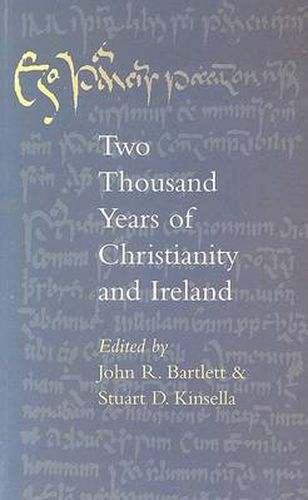Readings Newsletter
Become a Readings Member to make your shopping experience even easier.
Sign in or sign up for free!
You’re not far away from qualifying for FREE standard shipping within Australia
You’ve qualified for FREE standard shipping within Australia
The cart is loading…






How did Christianity arrive in Ireland? How long did its reputation as an island of saints and scholars last? Why did the Reformation not take hold in Ireland? What impact did the Penal laws have on religious practice? What does the future hold for Christianity in Ireland in the twenty-first century? These are some of the questions considered in this collection of eleven essays originally given as lectures at Christ Church Cathedral, Dublin. Sean Freyne traces the origins of Christianity and its spread through the Roman Empire, while the introduction of Christianity into Ireland and the establishment of the primacy of Armagh is examined by Catherine Swift. Many of the coastal cities of Ireland were Viking in origin, and Howard Clarke gives a case study of the conversion of the Dublin Vikings to Christianity. Michael Haren expands on the intricacy of papal bureaucracy in the medieval period, while Marie Therese Flanagan traces the complex causes of the reformation of the Irish church in the twelfth century. Bernadette Williams gives an overview of the mendicant orders in Ireland in the late medieval period. The Reformation period is dealt with by Colm Lennon in his essay on its implementation and on the Counter-Reformation which ensued. For the modern period, James Kelly addresses the topic of the Ascendancy and the Penal laws, while Andrew Pierce examines theological and ecclesiastical developments of the nineteenth century. In the final essay, which focuses particularly on ecumenism, Ferdinand von Prondzynski discusses the challenges facing the Irish churches in the twentieth and twenty-first centuries. No single volume can claim to be a definitive history of two thousand years of Christianity, but this collection of essays provides an accessible introduction to the topic from an Irish perspective. In a world ever more polarised by religious conflict, one modest hope of this book is that it would encourage the inquisitive non-specialist to delve further into the myriad complexities of over two millennia of religious history and culture.
$9.00 standard shipping within Australia
FREE standard shipping within Australia for orders over $100.00
Express & International shipping calculated at checkout
How did Christianity arrive in Ireland? How long did its reputation as an island of saints and scholars last? Why did the Reformation not take hold in Ireland? What impact did the Penal laws have on religious practice? What does the future hold for Christianity in Ireland in the twenty-first century? These are some of the questions considered in this collection of eleven essays originally given as lectures at Christ Church Cathedral, Dublin. Sean Freyne traces the origins of Christianity and its spread through the Roman Empire, while the introduction of Christianity into Ireland and the establishment of the primacy of Armagh is examined by Catherine Swift. Many of the coastal cities of Ireland were Viking in origin, and Howard Clarke gives a case study of the conversion of the Dublin Vikings to Christianity. Michael Haren expands on the intricacy of papal bureaucracy in the medieval period, while Marie Therese Flanagan traces the complex causes of the reformation of the Irish church in the twelfth century. Bernadette Williams gives an overview of the mendicant orders in Ireland in the late medieval period. The Reformation period is dealt with by Colm Lennon in his essay on its implementation and on the Counter-Reformation which ensued. For the modern period, James Kelly addresses the topic of the Ascendancy and the Penal laws, while Andrew Pierce examines theological and ecclesiastical developments of the nineteenth century. In the final essay, which focuses particularly on ecumenism, Ferdinand von Prondzynski discusses the challenges facing the Irish churches in the twentieth and twenty-first centuries. No single volume can claim to be a definitive history of two thousand years of Christianity, but this collection of essays provides an accessible introduction to the topic from an Irish perspective. In a world ever more polarised by religious conflict, one modest hope of this book is that it would encourage the inquisitive non-specialist to delve further into the myriad complexities of over two millennia of religious history and culture.